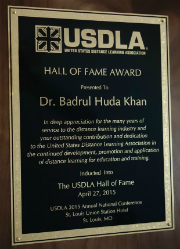 Scholarly literature including articles, theses, books and abstracts citing the e-learning framework can be search through Google Scholar. Scholarly literature including articles, theses, books and abstracts citing the e-learning framework can be search through Google Scholar. |
The following proposals, plans & reports adopted /used the framework (submitted by readers). You can email an article that uses the e-learning framework (khan1 @ McWeadon.com)
- Developing E-Learning for Kazak National University By Aigul Imadildayeva. The university’s current system is not reliable; also it is outdated in terms of its structure; and need to be replaced with e-learning system. Khan’s Octagonal theoretical model for e-learning has been used in order to lead this project.
-
Status of Seafarer CBT and Comparison of IMO CBT Guidance with U.S. CBT Standards By Captain Albert R. Stiles Jr. and John Dumbleton
(This report uses the checklist Framework developed by Badrul Khan. - 2001 Flexible Learning Leaders Professional Development Activity: Cultural Diversity and Flexible Learning by Lyn Goodear
(This report states, “Khan (2001) believes today’s generation of instructional designers need to respond to the challenge of designing open, flexible and distributed learning environments for diverse learners through the creation of dimension and sub dimensions of the web based learning framework. He encourages development to consider a range of dimensions including: pedagogical, technological, interface design, institutional, ethical, resource support, management and evaluation. His model encourages consideration of social and cultural diversity, geographical diversity, learner diversity and etiquette and is worthy of consideration for Australian FLMs.” - Impact of E-Learning on Higher Education : Development of an E-Learning Framework by Kifayat Ullah Khan, and Atta Badii (Pakistan)
- Developing eLearning Strategy in Universities in Bangladesh. by Badrul Khan (See CHAPTER – 8 page 78-91)
- COLLABORATIVE BLENDED LEARNING METHODOLOGY (CBLM). The WebQuest for HRM project has been funded with support from the European Commission under the Lifelong Learning Programme Leonardo da Vinci. PROJECT NUMBER: 2010-1-PL1-LEO05-11466 (Khan’s Framework p. 12)
- Modified Khan eLearning Framework for the Iraqi Higher Education by Amer Saleem Elameer and Rozhan M. Idrus
- A social networked learning adoption model for higher education institutions in developing countries by Godfrey Maleko Munguatosha, Paul Birevu Muyinda and Jude Thaddeus Lubega.
- REVISIÓN DE MARCOS INTERNACIONALES SOBRE ESTRATEGIAS DE INCORPORACIÓN DE TIC, Ministerio de Educación Nacional Dirección de Fomento a la Educación Superior, República de Colombia
- IT Security Awareness Training Plan for the National Student Clearinghouse by Kim Duclos
The e-learning framework was used to analyze eight dimensions of e-learning (Institutional, Management, Technological, Pedagogical, Ethical, Interface Design, Resource Support, and Evaluation) to produce a fully informed and effective learning and management plan. Through this analysis it was discovered that NSC is poised to implement company-wide e-learning initiatives without any major barriers or costly upgrades. Although, NSC does not currently have a learning management system (LMS), its current technology tools, such as the corporate Intranet, can be used for training implementation and tracking. - National Virtual Education Plan: Enhancing Education Through E-Learning in Developing Countries. by Badrul Khan.
- Contrasting and Diverse Global E-Learning Initiatives: An Examination of the African Virtual University, the National University System, and Vietnam’s TOPICA Project
by Sidney R. Castle & Dang My Chau - The Effectiveness of Distance Learning in Independent Pharmacy Ownership Scheme (IPOS) training context by Mary O ’ Brien
- A framework for the integration of e-learning in higher education institutions in developing countries by Geoffrey Kituyi and Irene Tusubira
OTHER
- ECOMPETENCE AND EFFECTIVE PRACTICES IN HIGHER EDUCATION by Thomas Pfeffer, and Sjoerd de Vries
- National eLearning Strategy for Higher Education (Jordan)
- Rand Report uses Badrul Khan’s definition of distributed learning.
- CTYP_2012-2015: Commonwealth of Learning: Three Year Learning for Development Plan ( 2012 to 2015). The plan adopted Badrul Khan’s definition of e-learning. (page 19)

